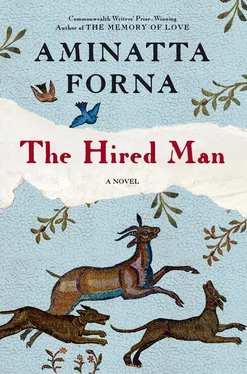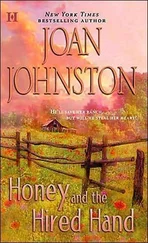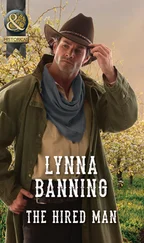I’d been wrong if I thought Krešimir could no longer get to me. I felt a trickle of anger between my shoulder blades. I shook my head and shrugged, whistled to the dogs and walked away from him. After a few seconds I heard the sound of his car door, the engine starting.
We were sixty, seventy metres or more ahead. Zeka had crossed into the field for one last rabbit run. We reached the gravel, just a few metres from the house, and Kos began to drift across the road towards the house, ready for her supper. As soon as I heard the speed of the car’s approach I called Kos back. She hesitated, confused by a command that didn’t make sense. As far as she was concerned we were home. Her hearing was going, she didn’t trust it. Instead she obeyed her instincts and turned back towards the house. And Krešimir, approaching, didn’t brake. Kos’s hip was struck by the Saab’s front bumper. She was knocked up and sideways by the impact. For a moment she hung in the air, head skewed, then she dropped to the road.
The first shell lands on a house near the playground. No one is killed. The kids who were playing scream and flee, then return to stare in silence at the damage, as if they are worried they’ll somehow get the blame. In the second week a shell blows one of my father’s huts apart. My father is inside. Daniela is standing at the door delivering a meat paste sandwich sent by my mother. My father is fixing the roof, which will be blown away a few minutes later. Afterwards, in the other huts (where none of us had been allowed) we find broken coffee grinders, an inflatable paddling pool, electric bar heaters, a wooden clothes horse, pots without handles, a box of my old toys, two beehives and many pairs of old rubber boots. In the smallest of the sheds we find cardboard boxes of tinned food, mainly green beans, and sauerkraut. In another hut: car batteries, still serviceable. The last shed is stacked with wood: planks, sawn logs and kindling.
My father, who unknown to us was in the earliest stages of dementia, will thus spare us the worst of the siege weeks.
A Wednesday, I think, the days have begun to blend. All those things that once helped make one day different from the next: school, church, work, newspapers, the opening of a new film at the cinema, basketball games and football matches — these things can’t be relied on any more. I am on the far side of the ravine. On the other side, above the woods, is the soldiers’ camp. It is close to five o’clock in the morning and still pretty dark. At this time the soldiers are asleep in their tents. In a few hours: awake, shaved and breakfasted, they’ll begin to lob shells at us, and we, on the cue of the first whistled warning, will run home to dive into our cellars. When I was a kid I kicked an anthill once and watched the ants, each carrying a glistening torpedo, scrambling to carry their eggs to safety. I watched and wondered if they could see me, the giant in the sky who’d just wrecked their world. These days whenever I see a woman running down a road with her child in her arms, I remember the ants.
Two pigeons tied to my belt. I must be back before the soldiers wake up. The sound of the shotgun doesn’t bother them; so far Gost has offered little resistance, because all we have are shotguns and hunting rifles and they have 120 millimetre mortars, and because they are out of range and out of view, hidden in the trees in the old concrete bunker at the top of the hill.
A colony of crows is rousing, stirring and squabbling in the branches, a convention gathers on the grass below, thirty birds or more, facing west into the wind. I wait, wanting to make the best of a single cartridge. When one of the crows on the ground crosses in front of another, I fire. The flock take to the sky, two birds remain on the ground. Ten minutes later I leave the pigeons in a bag at my mother’s door and head to the blue house. These days the door is sometimes locked, so I knock and after some minutes Anka appears. ‘Hey, Duro.’ She makes coffee as I set to work on the birds. She wears an old cardigan and has pulled a crocheted shawl from the back of one of the chairs around her shoulders; flat-footed, her face sleep-smudged, the imprint of the pillow on one side of it. She fetches two cups and sits at the table to watch me. I split the breast of each bird and pull out medallions of meat. The remainder of the carcasses I toss into the bucket by the door to boil for Kos. Meat is scarce. People trap rabbits, but the deer are too far up the hill, too close to where the soldiers camp.
‘Only two pigeons today,’ I said. ‘I gave them to my mother. I’ll bring you the next one.’
Anka smiles. ‘Give your mother the pigeons. Don’t worry about us.’
‘She can only eat so much pigeon.’
‘But we like crow. We love crow. Come over later. We’ll have it with thyme and tomatoes. I don’t understand why it doesn’t catch on.’
‘In Paris they ate elephant.’
‘Who did?’
‘The Parisians, during the siege. They ate elephant. They ate rats and cats, too. And dined on elephant steaks.’
‘Liar. Where would they get elephants from?’
‘From the zoo.’
‘They ate the exhibits? What did it taste like?’
‘I have no idea. Like pork, maybe.’
Anka pulls her chin in and tilts her head to one side. She draws the shawl around her shoulder and shakes her head slowly in disbelief.
‘Where’s Javor?’ I ask.
She jerks her head towards the staircase. ‘Asleep,’ she says. ‘We’re only being bombed every day. Not enough to lose sleep over. I’m the one who doesn’t sleep.’ She laughs and I do, too. Javor always loved his sleep. At that moment he appears rubbing his head and sits down at the table. ‘Talk of the devil,’ says Anka.
‘What’s so funny?’
‘Nothing,’ she says and helps him to coffee, leaning into him as she does so, pressing her belly against his back.
‘Hey, Duro, heard the one about the refugees and the dumper truck?’ says Javor. He tells a story about a group of refugees from the east who fled in the back of a dumper truck. One of them was a pretty girl and the driver of the truck invited her to sit in the cab with him. The two got along very nicely. The driver impressed the girl with details about his truck, its size and load capacity, the purpose of various levers and buttons. At some point the driver made a piss-stop. He went to the back of the truck to open the tailgate so the people could get out. But he must have failed to apply the hand-brake properly because the truck began to creep forward. He called to the girl still sitting in the cabin. The girl, who had been paying only slight attention to the driver’s talk, pulled the wrong lever: the one that operated the hydraulics to raise the dumping bed. She dumped the refugees on top of the driver.
You see, even then we could laugh, though my father and sister were already dead.
Anka says, ‘I want grapes and cheese. Green grapes and Greek cheese.’
‘Feta,’ says Javor.
‘Feta,’ repeats Anka softly.
‘Maybe I can get you some cheese, it will be just like feta, you’ll never know the difference. We can ask Fabjan.’
‘And grapes?’
‘That might take longer.’
Anka throws her head back and groans. ‘I’m sick of eating everything from a jar.’ By now we’ve eaten the contents of our kitchen gardens, we are eating the bottled fruit and vegetables we have put aside for the winter. They’ll last a good while, because in this part of the world we treat every winter as though it is the last.
In the evening I return with a bag of cherries. Anka is in the outbuilding removing a pot from the kiln. It is a deep bowl with an inwardly curving rim. The road south has been closed for weeks now; the trips she used to make to the coast in her Ficó to fill her orders with the tourist shops are no longer possible. There are no tourists. The coast is another country again. Behind me: stacks of wooden crates stuffed with decorated dishes, ashtrays, fridge magnets, all packed in straw. Anka has given up making these things. War has given her a kind of freedom and her work provides a place of refuge from the craziness. She sets the bowl on an old lead-topped table. When she sees me, or rather the cherries, she squeals and swoops, grabs a handful and rams it into her mouth. Juice spills from the corner of her lips; she looks like a young and healthy vampire.
Читать дальше












